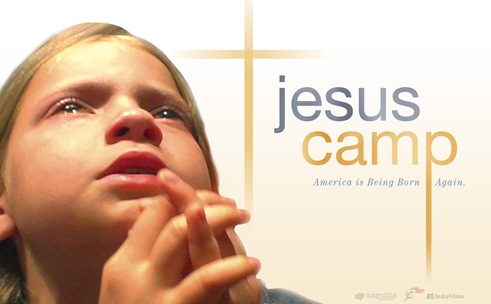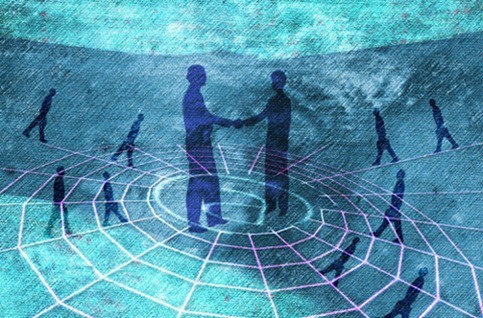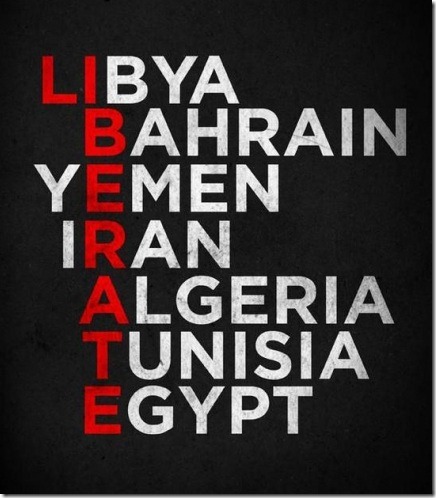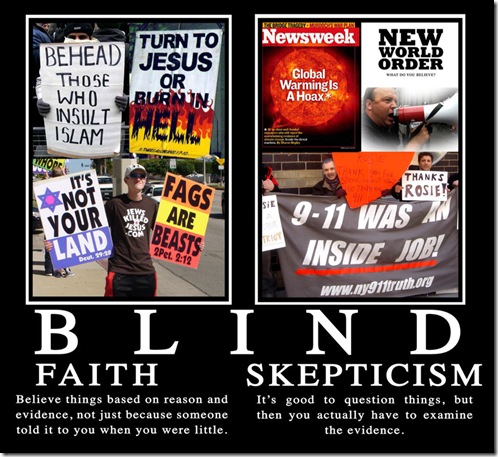You are currently browsing the category archive for the ‘Freethinkers' Night’ category.
Whereas Christianity is in decline in Europe, in Africa it is still very strong.
Speaking as a rationalist and freethinker who believes he has objectively assessed the available data and has come to the conclusion that:
-
Its hard to take faith-healing seriously anymore.
-
Its hard to take stories of ‘demon-possession’ seriously anymore.
-
Its hard to take pastors seriously anymore.
-
Its hard to take bible-thumping politicians seriously anymore.
-
Its hard to take the Gospels seriously anymore
-
Its hard to take the fear of hell seriously anymore
… I wonder, does Christianity as a worldview still have anything to offer anybody besides the kind of subjective personal validation that one could also derive by subscribing to any number of passions, hobbies, or interests? Further, there exist today many avenues for seeking motivation for life and healthy living that do not require belief in Jesus or even a ‘God’ – and yet there are many for whom this belief is their reason for living on a day to day basis.

Atheists like myself view this dependency as a crutch.
But is there more to it?
And even if it is a crutch – what’s wrong with that, considering the dire situation the majority of Ugandans live in?
Matthew Parris an atheist, and journalist, wrote the following in his defense of Evangelical Christianity in Africa in the Times:
But travelling in Malawi refreshed another belief, too: one I’ve been trying to banish all my life, but an observation I’ve been unable to avoid since my African childhood. It confounds my ideological beliefs, stubbornly refuses to fit my world view, and has embarrassed my growing belief that there is no God.
Now a confirmed atheist, I’ve become convinced of the enormous contribution that Christian evangelism makes in Africa: sharply distinct from the work of secular NGOs, government projects and international aid efforts. These alone will not do. Education and training alone will not do. In Africa Christianity changes people’s hearts. It brings a spiritual transformation. The rebirth is real. The change is good.
I used to avoid this truth by applauding – as you can – the practical work of mission churches in Africa. It’s a pity, I would say, that salvation is part of the package, but Christians black and white, working in Africa, do heal the sick, do teach people to read and write; and only the severest kind of secularist could see a mission hospital or school and say the world would be better without it. I would allow that if faith was needed to motivate missionaries to help, then, fine: but what counted was the help, not the faith. But this doesn’t fit the facts. Faith does more than support the missionary; transferred to his flock. This is the effect that matters so immensely, and which I cannot help observing.
The hospitals, the schools, the charity work, the encouragement, the world view the belief system of Christianity contributes to Africa – all these are things Parris feels Africa cannot do without at this present time.
He adds:
Anxiety – fear of evil spirits, of ancestors, of nature and the wild, of a tribal hierarchy, of quite everyday things – strikes deep into the whole structure of rural African thought. Every man has his place and, call it fear or respect, a great weight grinds down the individual spirit, stunting curiosity. People won’t take the initiative, won’t take things into their own hands or on their own shoulders.
How can I, as someone with a foot in both camps, explain? When the philosophical tourist moves from one world view to another he finds – at the very moment of passing into the new – that he loses the language to describe the landscape to the old. But let me try an example: the answer given by Sir Edmund Hillary to the question: Why climb the mountain? “Because it’s there,” he said.
To the rural African mind, this is an explanation of why one would not climb the mountain. It’s… well, there. Just there. Why interfere? Nothing to be done about it, or with it. Hillary’s further explanation – that nobody else had climbed it – would stand as a second reason for passivity.
Those who want Africa to walk tall amid 21st-century global competition must not kid themselves that providing the material means or even the knowhow that accompanies what we call development will make the change. A whole belief system must first be supplanted.
And I’m afraid it has to be supplanted by another. Removing Christian evangelism from the African equation may leave the continent at the mercy of a malign fusion of Nike, the witch doctor, the mobile phone and the machete.”
Matthew Parris
It seems to me that Parris is saying Christianity is somehow necessary to fill the philosophical and metaphysical vacuum left by the erosion of traditional beliefs that have previously given Africans a cohesive albeit irrational worldview – because such a vacuum would leave Africans at the mercy of undesirable influences such as those things he mentions (though his selection criteria for those things is not clear).
It would not surprise me if some feel such sentiments to be patronizing in nature. I could see how one might accuse Parris of trying to imply that Africans are currently incapable of handling rationality and reason – and so at present need Christianity to save them from themselves. But even then, rather than infantilise Africans by replacing one crutch with another, why not give them the chance to learn how to walk on their own? The fact that there exists a growing number of atheists on the continent seems to challenge the implication that we are somehow unable to deal with reality without having Christianity as a crutch. Today, many Africans are increasingly looking at the world around them through a rational lens and are coming to the conclusion that one need not subscribe to religion to be moral, and charitable. Many of us have also realised that mysticism is not required as a foundation for a cohesive view of reality.
Norm Allen, the former executive director of African Americans for Humanism, wrote in his response to Parris:
I readily admit that missionaries have done some great work in Africa—building roads, clinics, schools, etc. However, missionaries in recent years have also enriched themselves while exploiting the masses, discouraged millions of Africans from using condoms, thereby increasing unwanted pregnancies and the spread of Aids, promoted sexism, contributed greatly to the persecution and deaths of alleged witches, etc. Indeed, Africa provides the perfect example of what Robert Ingersoll said about the historic role of the Catholic Church: “In one hand she carried the alms dish, in the other, the dagger.” The same could be said of organized religion in general.
In Rwanda, Christians were complicit in the genocide that occurred there in the 1990s. Many people were brutally murdered in churches. In Nigeria, Christians and Muslims have been killing each other by the thousands. Throughout Uganda, Zimbabwe, Nigeria and many other African nations, Bible-based homophobia plays a major role in the persecution, and in some cases, murders, of LGBTs.
What Africa needs is what Ingersoll called “a caring rationalism.” The Bible simply contains too many ultra-reactionary and inhumane messages to be blindly embraced by believers. Christian ideas of tolerance are inconsistent with the biblical notion that acceptance of Christ is the only way to reach heaven. The Prince of Peace said he came to bring not peace, but a sword. It is no wonder that there are so many different conceptions of Christianity, not all of them benign.
A humanistic life-stance is the best way to approach the many divisive religious and ethnic conflicts that plague Africa. Human-centered thought and action offer much more for African uplift than piety and prayers ever could. Christian charity is, indeed, commendable. However our appreciation of the missionaries’ alms dish must never blind us to the dagger that so often accompanies it.
What do YOU think? Are you a believer? Then you probably disagree with atheists on this. Perhaps to you Christianity is real and is indeed the only path to one’s salvation – relevant today as it was 2,000 years ago.
This Freethinkers’ Night we are asking – Is Christianity Still Relevant in Africa?
We will be joined by several members of Mavuno Church, Kampala, who have expressed interest in participating in this discussion, with us.
The January 2013 Freethinkers’ Night will take place on Thursday, 31st January, at SPICE GARDEN (formerly 4 Points Bar & Restaurant), Centenary Park, Kampala, starting 6PM. Entrance is FREE.
If you are an open minded person whose opinions are formed on the basis of science, logic, and reason and are interested in meeting like-minded individuals – you are more than welcome to join us.
UPDATE: We attempted to record the discussion. The sound is inconsistent in the beginning but it gets better as it progresses. The recorder kept going off so there are breaks in just a few places, and it ends rather abruptly. That said, it is a fairly good recording – it sounds surprisingly much better than I thought it would, considering I recorded it using just my cellphone’s in-built recorder. Download.
We were, unfortunately, not able to have our meeting last month to discuss the topic “Is ‘Romantic Love’ a Form of Woo?” due to a problem with our usual venue that occurred just a day before the day of the meeting. The situation seems to have stabilized so we shall be convening to finally have the long-awaited debate.
The October 2012 Freethinkers’ Night will take place on Thursday, 25th October, at SPICE GARDEN (formerly 4 Points Bar & Restaurant), Centenary Park, Kampala, starting 6PM. Entrance is FREE.
If you are an open minded person whose opinions are formed on the basis of science, logic, and reason and are interested in meeting like-minded individuals – you are more than welcome to join us.
On September 4th 2012 I posted the following question on the Freethought Kampala Facebook page:
As freethinkers hasn’t the time finally come for us to debunk the notion of ‘romantic love’? It’s a highly toxic form of woo. It hurts people, and bankrupts them by giving them false hope. Surely, we have a moral obligation to disabuse people of that delusion, do we not? Don’t we need to let people know that ‘love’ is just chemicals playing tricks on our brains, and nothing more? We’d be saving them tons of grief.
I know, I know… its a pretty outrageous and hyperbolic thing to say.
The aim of the question was to kick-start a debate on an issue that I feel is hardly explored, even among skeptic circles – the notion of romantic love. As I had anticipated, the responses I got were very interesting.
One needs only to look at the kind of language typically invoked when discussing this elusive abstraction to notice how woo-ish it tends to be: Soul mate, the ‘one’, fate, destined for each other, eternal, transcendent, spiritual… etc.
Woo refers to:
“…ideas considered irrational or based on extremely flimsy evidence or that appeal to mysterious occult forces or powers.”
Source: The Skeptic’s Dictionary
Many of us talk about romantic love as if it were something deeply mystical or magical. We will often justify otherwise ‘embarrassing’ behaviour by claiming that were overwhelmed by that inexplicable, beautiful and magical thing called romantic love. There is supposedly a mysterious force that a lot of us believe sweeps over people when they find that ‘special’ person, leading them to do things they will regret later (presumably after they’ve ‘returned to their senses’):
Ecstatic expressions of emotions like what we see Tom Cruise doing in the above video can also be found in the more charismatic forms of religious practice:
Believers, of course, will suggest that such experiences are the work of mysterious spiritual forces, or the power of ‘God’.
Believers of romantic love (in a mystical sense) and believers in ‘God’ thus seem to have something in common – that being the propensity to attribute certain emotional states to magical forces.
Science:
Those of us that are aware of what science has to say about these matters will attribute these feelings to brain chemistry and psychological factors.
Our brains and bodies are built – through evolution – to predispose us towards seeking bonds with others, and to be sexually attracted to members of the opposite sex (all exceptions to this general trend are duly noted, dear social justice warriors) so that we might attempt to mate with them, and produce and nurture offspring. The collective range of emotions that we normally experience in pursuit of this biological imperative (courtesy of a cocktail of interesting chemicals) is what we normally mean when we talk of ‘romantic love’.
Helen Fisher (PhD Biological Anthropologist) defines romantic love as a ‘basic mating drive’. In the video of her TED talk above (from 2008), she states:
Romantic love enables you to focus your mating energy on just one at a time energy conserve your mating energy, and start the mating process with a single individual.
Fisher makes an interesting point about the ways in which it resembles an addiction by having all of its characteristics:
…you focus on the person, you obsessively think about them, you crave them, you distort reality, you’re willingness to take enormous risks to win this person..
I can think of numerous potential problems arising from such an ‘addiction’, and I’m certain many would agree that these problems can be seen all around us. Romantic love leads many people to act in ways that are detrimental to their well-being (depression, suicide, murder). It also makes them open to manipulation by others. People also spend a considerable amount of time and personal resources in search of their elusive ‘true love’ that has been promised to them by those who profit from peddling the notion that such magical experiences await those who diligently seek it. Anecdotes abound about how happy the lucky few who have found it are. The (usually unverifiable) testimonies of these lucky few are then used as proof that a soul mate awaits all of us, and many will search in vain for years and years, leading to much distress and misery. And sometimes its a combination of all of the above problems. Just like woo.
This is not to suggest that I think people shouldn’t experience ‘romantic love’. I consider romantic love to be an illusion (just like free will) – but a beautiful illusion, no doubt. Of course, by enticing us with these alluring sensations, our DNA is simply manipulating us in order to propagate itself. That said, I suppose ‘romantic love’ is a nice little drug that makes life worth living. It can be a great motivator, inspiring us to do many great things. So how about just letting people know exactly what it is, then they can make an informed decision as to how they want to live their lives? I contend that it is more useful than not – to be aware of what might be going on inside your system when you’re going through this particular emotional roller coaster. Here I am reminded of how we, as critical thinkers realise that it is good to be aware of the naturally arising biases that cloud our thinking, so that we might take necessary steps to reduce the chance that those biases will influence our thinking. Similarly, once being made aware of the biological factors underlying these sensations we associate with romantic love, wouldn’t we be in better position to take appropriate steps to reduce the risk of falling victim to many of the pitfalls that come with it? It would seem unkind to keep people in the dark.
Helen Fisher makes another good point, towards the end of her TED talk:
People have often asked me whether what I know about love has spoiled it for me. And I just simply say, ‘Hardly’. You can know every single ingredient in a piece of chocolate cake and then when you sit down and eat that cake you can still feel that joy… and certainly I make all the same mistakes everybody else does too.
But it’s really deepened my understanding and compassion, really, for all human life.
That’s where I’m coming from in asking questions about ‘romantic love’.
Here are some of the comments from the Facebook exchange:
Lilliane Nsk: these chemicals help form a long-lasting bond between the pair which is necessary (at least it used to be) for the survival of the the newborn human offspring. hence the survival of the trait. maybe in a million years, with artifical wombs and store-bought semen, we might eventually mutate the gene out of the species…
Marvin Muganzi: used to wear my ‘heart’ on my sleave til some1 introduced me to reality..she cheated:(.
Dealing with the withdraw from the emotions i was addicted to was the tricky part. How do u plan on convincing our love birds out there that their fluffy feelings are only neurons playing tricks on our minds?Irene Bileni: love does not lie or hurt..its the people who do and make it ugly
Khayinja Bernard Wegulo IV: Rationalize it all you want people are not going to stop being emotional… chemicals or not human being are predisposed towards being emotionally irrational.
Guxille Tim Okema: love is just one stinking emotional illusion..a mirage of everlasting euphoria only to end in a heartbeat
Stella Nantongo: If a placebo is working, why the need to tell one its just that..a placebo?!
Hassan Higenyi: Come to think of it, since the god debate is almost exhausted in that there’s almost nothing new you can say or write that hasn’t already been said or explored by freethinkers before, and it’s even a boringly tired topic nowadays; romantic love would seems rather a fresh and more intellectually exciting and challenging (controversial) a subject for rational debate by this generation’s freethinkers seeking to advance freethought by remarkably applying it to other aspects of human life/nature like, well, love (of all non-things!), unlike in the past when freethinkers seemingly only concerned and dwelled on religion, politics, and -isms. Interestingly, the arguments for/against “romantic love” and the god debates are strikingly similar with regards to the rationality or irrationality of either, and thus the correlations with the belief and/or unbelief in either, and thus those tending towards for or against. I mean, think about it rationally, or rather comparatively, the notions involved in romantic love, like love at first sight, are like religious superstition, and the feelings are faith. Just saying 🙂
Sophie B Alal: If love is a drug, I don’t want rehabilitation. I’ve been transformed as a human by the endorphins, I’m happy, hopeful, talented and aware of my endless potential because of love 🙂 Sorry losers, but try loving.
Do you think it is a settled matter? No? Good – because this loser hereby invites you to join us to debate this some more.
The September 2012 Freethinkers’ Night will take place on Thursday, 27th September, at SPICE GARDEN (formerly 4 Points Bar & Restaurant), Centenary Park, Kampala, starting 6PM. Entrance is FREE.
If you are an open minded person whose opinions are formed on the basis of science, logic, and reason and are interested in meeting like-minded individuals – you are more than welcome to join us.
During the first discussion, we explored the open source movement going on all around the world in which people are agreeing to collaborate on any project; software or hardware, share information, designs, source code, blue prints, etc, in order to achieve the common good and/or make some money along the way. We saw that these technologies are being applied in every field from computer operating systems to building cook stoves and tractors.
What some of us are really interested in is how we too can get started so we can we be apart of this open source movement. The technology is available, its low cost, information is largely available, collaborators are all around us even across the world, and most importantly there is the need for us to get together so we can do something practical for the common good.
In this discussion I hope to present an analysis of the fastest growing open technologies pointing towards mobile devices, mobility and connectivity and how they give us an opportunity to get started.
Presented by: Yusuf Mulinya
The August 2012 Freethinkers’ Night will take place on Thursday, 30th August, at SPICE GARDEN (formerly 4 Points Bar & Restaurant ), Centenary Park, Kampala, starting 6PM. Entrance is FREE.
If you are an open minded person whose opinions are formed on the basis of science, logic, and reason and are interested in meeting like-minded individuals – you are more than welcome to join us.
You visit a pub, office, online forum, or go to a party somewhere with lots of interesting people. Or maybe you have been invited to participate in a discussion on radio or television over a particular issue. Maybe you are at a meeting where the goal is to exchange ideas with different people and challenge each other with regards to certain issues.
You encounter someone who does not agree with your views.
You have reasons to believe you are right, and that the other person is wrong.
The other person feels exactly the same way, and thinks YOU are wrong.
The good thing is, that person is willing to sit down and have a discussion or engage in a debate about this with you.
How should you both proceed in order for that discussion or debate to be constructive?
There are many different types of formal approaches to debate in existence. What we are interested in discussing is what you would need to do to have a friendly, productive, debate or discussion with someone you might encounter in a more informal setting.
Of course, there’s no reason why some of what we’ll learn can’t be applied in a formal setting too.
The July 2012 Freethinkers’ Night will take place on Thursday, 26th July, at SPICE GARDEN (formerly 4 Points Bar & Restaurant ), Centenary Park, Kampala, starting 6PM. Entrance is FREE.
If you are an open minded person whose opinions are formed on the basis of science, logic, and reason and are interested in meeting like-minded individuals – you are more than welcome to join us.
Related post:
 According to Wikipedia, Jesus Camp is:
According to Wikipedia, Jesus Camp is:
… a 2006 American documentary film directed by Rachel Grady and Heidi Ewing about a charismatic Christian summer camp, where children spend their summers learning and practicing their prophetic gifts and being taught that they can "take back America for Christ."
This film raises interesting questions about the ethics of indoctrinating children, who, one could argue, are too young to provide informed consent about whether or not they would want to partake of religion – be it the religion of their parents. There are some who have even suggested that indoctrinating children is tantamount to child abuse:
On the other hand, good parenting is often thought to be the act of instilling values and morals into children so that they can grow up to be responsible human beings. If those values and morals are part and parcel of a religious worldview, then it seems almost inevitable that children will have to be taught the tenets of the religion that incorporates those values and morals.
If this is the case, then is the issue one of the degree of indoctrination?
Maybe all of this is irrelevant. After all, would it not be a violation of the parent’s right to freedom of worship, for them to be denied the right to impart to their children the tenets of the faith they subscribe to? Many religious people, in fact, believe that it is their mandate from their ‘God’ to instruct their children in the ways of the faith. Are they justified? Or should parents wait until the child is 18 and is able to provide consent, or make her or his own informed choice about which path to follow – even if it ends up being a path that the parents disapprove of?
Let’s watch the movie, then discuss!
The June 2012 Freethinkers’ Night will take place on Thursday, 28th June, at 4 Points Bar & Restaurant (now called SPICE GARDEN), Centenary Park, Kampala, starting 6PM. Entrance is FREE.
If you are an open minded person whose opinions are formed on the basis of science, logic, and reason and are interested in meeting like-minded individuals – you are more than welcome to join us.
 The Arab Spring – a series of public protests and demonstrations that swept through north Africa and other parts of the Middle East from December 2010 (and is still on going in some countries) – has got a lot of people talking about the ‘will of the people’ and how this power might be harnessed to effect change, in the face of societal discontent.
The Arab Spring – a series of public protests and demonstrations that swept through north Africa and other parts of the Middle East from December 2010 (and is still on going in some countries) – has got a lot of people talking about the ‘will of the people’ and how this power might be harnessed to effect change, in the face of societal discontent.
It is difficult to gauge what positive effects to the socio-economic wellbeing of the people in the countries involved resulted from these particular popular uprisings. It would appear, instead, that things have taken a turn for the worse. A number of negative socio-economic effects have been observed:
The Arab Spring revolutions have, ironically, increased the levels of unemployment in the region. A revolution intended to meet the aspirations of the youth has instead resulted in more of them being unemployed.
Egypt witnessed an increase of the unemployment rate during the fourth quarter of 2011 to 12.4% of the labor force, compared to 11.9% for the same period in 2010. The unemployment rate in Morocco reached 30% of people aged between 15 and 29 years up to January 2012. Algeria had the highest unemployment rate of 22%, due to the return of most of the workers from Tunisia, Libya, Syria and Egypt; and Tunisia had an unemployment rate of 18.9% by the end of 2011.
A study by the World Bank last year stressed the need for Arab countries to have 100 million jobs by 2025, only to maintain the current unemployment levels and prevent them from increasing. The study also stated that the unemployment rates in the Arab countries ranged between 25% and 30% in 2011, and these figures are the highest in the world.
In Morocco people have recently taken to going back to the streets in protest, since the changes the people had hoped for have not been forthcoming, even after political reform:
Tens of thousands of Moroccans took to the streets of Casablanca on Sunday in the largest opposition protest since an Islamist-led government took office, reflecting mounting tensions over unemployment and other social woes.
The protest was organised by trade unions which accuse Prime Minister Abdelilah Benkirane of failing to deliver on the pledges of social justice that brought his party to power in the wake of the Arab Spring.
"There are more than 50,000 people who are demonstrating to call on the government to start a genuine dialogue addressing our country’s social ills," opposition Socialist MP Hassan Tariq said.
A official estimated the crowds at between 15,000 and 20,000.
Not much seems to have changed in Egypt either, even in terms of respect human rights:
The Egyptian military junta has intensified its violent crackdown on protesters before the presidential elections scheduled for May 23. On Friday afternoon, military police and security police working with armed thugs brutally attacked protesters in front of the Ministry of Defense at Abbasseya Square in Cairo.
The protesters called for the fall of the US-backed military junta and the execution of its leader, Field Marshal Mohamed Hussein Tantawi.
Military and police forces started their attacks Friday afternoon, claiming that demonstrators had tried to storm the Ministry of Defense. They used water cannons, tear gas and live ammunition against the protesters, who defended themselves with stones. At least two protesters and one soldier were killed and hundreds injured. The military enforced a curfew in the area. According to the “No To Military Trials” activist group, 311 male and 18 female protesters have been arrested and threatened with military trials.
More protests, more violent crackdowns – in short, more of the same from the Mubarak era.
In the face of this, would one be justified in concluding that the Arab Spring has been a failure?
Maybe not.
There are noticeable political changes, for starters, that might be construed as positive. One could say it has encouraged participation of more people in politics, such as the women of Libya, and Islamist parties in Egypt – and that this in and of itself is a good thing. But then, with these political changes, freedom of expression seems to be no better tolerated than it was before:
The four Arab countries where the leaders have been toppled are now in the hands of Muslim fundamentalists, who used the “Arab Spring” as a vehicle to rise to power.
Tunisia’s Islamist party, Ennahda, is already demanding an Islamic state. Human rights activists say that with the arrival of the “Arab Spring,” freedom of speech in Tunisia, instead of growing, has died.
Nabil Karoui, owner of a Tunisian TV station, is currently on trial for blasphemy after airing the French-Iranian animated film “Persepolis,” which features a cartoon depiction of God. About 150 lawyers filed lawsuits against Karoui for “violating sacred values” and disturbing public order.”
Two weeks ago, hundreds of Muslim fundamentalists who follow the radical Wahhabi doctrine of Islam took to the streets of Tunis to demand the implementation of Sharia laws in their country.
Has the Arab Spring been worth the nearly 50,000 lives lost?
Come join the discussion.
The May 2012 Freethinkers’ Night will take place on Thursday, 31st May, at 4 Points Bar & Restaurant, Centenary Park, Kampala, starting 6PM.
Entrance is FREE.
If you are an open minded person whose opinions are formed on the basis of science, logic, and reason and are interested in meeting like-minded individuals – you are more than welcome to join us.
Skepticism generally refers to :
…any questioning attitude towards knowledge, facts, or opinions/beliefs stated as facts, or doubt regarding claims that are taken for granted elsewhere.
There are many things we are told we should not question. Many religious, cultural beliefs fall in this category of things for which questions must be never asked. There are also all kinds of social and economic ideologies that are taken for granted. Other times we believe things for the simple reason that a lot of people seem to believe it.
This month, we’d once again like to take a look at some of the things we think we should all be more vigilant in asking questions about – and how to go about asking those questions in such a way that we can be fairly confident that we have arrived at the correct conclusion.
Might there be limits on how skeptical we should get?
Can one be skeptical of skepticism itself?
Come join the discussion!
The April 2012 Freethinkers’ Night will take place on Thursday, 26th April, at 4 Points Bar & Restaurant, Centenary Park, Kampala, starting 6PM.
Entrance is FREE.
If you are an open minded person whose opinions are formed on the basis of science, logic, and reason and are interested in meeting like-minded individuals – you are more than welcome to join us.
 I am a strong proponent of disruptive technologies and what their impact is on societies and economies.
I am a strong proponent of disruptive technologies and what their impact is on societies and economies.
Disruptive technology is a term coined by Harvard Business School professor Clayton M. Christensen to describe a new technology that unexpectedly displaces an established technology.
Everyone knows the impact of such technology on the music industry through the rise of peer to peer technologies such as Napster, Limewire, torrents etc. global music sales have nearly halved in 10 years from 1999 to 2009 when they moved from $15bn to $7bn. We are clearly witnessing the trend in media where the coming of alternative media through social networking, YouTube, personal blogging and podcasts is threatening the life of major publications worldwide as the industry has been disrupted by this alternative freely available, free to share and collaborate on technology.
Furthermore, we are also well aware of open-source software and its impact. We can mention lots of projects going on in the world of software from major operating systems like Linux Vs Windows, to accounting software like Front Accounting Vs Quick Books, and mobile phone software like Android Vs Mac OS. open-source software is more collaborative, free to distribute and modify, and is building communities around them. These are the key attributes of this open-source model.
What we are now witnessing around the world is a movement towards open-source hardware, and at this point, this is where I feel we need to put some attention. This movement is sharing designs, instructions, parts lists, wikis and all detail concerning the making of machines, creating a global community of collaborators and replicators and is publishing all their works on the internet.
The reason I feel that we need to put some attention to this movement is because hardware is something that can change people’s lives in such material and tangible ways. The examples discussed above on music, media, software have enabled many of us access the technologies either free of charge or at a low cost. Therefore open-source model is not only a low cost model, but a model to achieve a mass impact on our communities.
So what does open-source hardware avail us? One of the most fascinating projects I am following is Open Source Ecology. This is an organisation that is publishing an open-source DIY list of 50 machines, called the Global Village Construction Set (GVCS), a single DVD with all the information on what it would take to create a civilization with modern day comforts. The list includes bread ovens, circuit makers, computer controlled machines, wind turbines, tractors, brick making machines and so on, all following the attributes of open-source model.
Not only can we breakthrough into farming, manufacturing and construction through the reduced barriers of entry like high cost and copyright, but also be able to disrupt the current economic and social setting which is dominated by artificial scarcity, increasing our chances of solving problems that our societies and country is facing at large. When we are faced with a power shortage, we have steam engine plans; when we are faced with the housing crisis like the one we are faced with right now of a shortage of over 500,000 units, we will have an open-source Compressed earth brick machines which make 5,000 bricks a day (effectively 1hourse per day).
I am able to point at many other examples of open hardware and how its changing our lives like the Earth Bag building technique which is a low cost housing method which I personally have tested and is a real solution to our housing needs.
I wish to share this information with Freethought Kampala members at the March Freethinkers’ Night. I believe that it’s about time we implemented some real solutions to our problems. And what better way to do this than by starting with an education process that exposes such disruptive technologies!
Presented by: Yusuf Mulinya
The March 2012 Freethinkers’ Night will take place on Thursday, 29th March, at 4 Points Bar & Restaurant, Centenary Park, Kampala, starting 6PM. Entrance is FREE.
If you are an open minded person whose opinions are formed on the basis of science, logic, and reason and are interested in meeting like-minded individuals – you are more than welcome to join us.
Anyone familiar with charismatic expressions of Christian belief in Uganda (mainly through Pentecostal/Balokole/Born-Again/Evangelical churches) knows that emotions and fanfare play a large part in the proceedings.
Typically struggling with everyday problems and desperate for divine intervention, every week (and sometimes more frequently) millions of believers flock to these churches in search for their ‘miracle’. Problems such as unemployment, marital trouble, poverty, and illness are deferred to Jesus Christ who they believe will solve those problems, or give them the strength to persevere through them.
In Charismatic Christianity in Uganda (Part 1 – Introduction) I wrote that:
The popularity of this form of Christianity has exploded over the last few decades because the doctrine promises poor, under-educated believers miraculous solutions to their everyday problems. Understandably, on an impoverished continent like this one, a religion that offers quick fixes to all the pressing problems in life will be immensely popular, and that is exactly what we see happening. Among charismatic Christians, things like unemployment, failure of business, failure of marriage, sickness, corruption in government… all the problems an individual or society could possibly face… are attributed to Satan, demons and other evil spirits – and Jesus is presented as the antidote.
Such an iteration of Christianity fits perfectly well with the mindset of most native Africans, most of whom have, since time immemorial, taken seriously the perceived threat of curses inflicted upon them by spirits and other bad omens. This is probably why charismatic Christianity has proven to be a raging success in sub-Saharan Africa.
This has literally created a cottage industry of make-shift balokole churches all over the country, typically run by unscrupulous, opportunistic individuals looking to earn a living from the lucrative business of ‘selling’ Jesus.
Competition is fierce among pastors of rival local balokole churches, after all, having more worshippers usually means bigger collections.
Indeed, this competition for ever bigger collections has produced a crop of what can best be described as showmen, rather than clergymen – evangelists, who, using their knowledge of human psychology are able to enthrall the masses with charismatic styles of preaching. By also knowing which emotional buttons to press, they are able to compel hordes of their desperate followers to part with their meager earnings in exchange for the promise of a miracle. Many of them are now also televangelists, recording their sermons and broadcasting them on television to broaden their reach.
It is difficult to tell who among these characters actually believes in the things they teach, and who are just doing it as a business. What we are seeing is probably a combination of both. Perhaps they see themselves as providing encouragement to their desperate flock, and feel that the ends justify the means. So whatever it takes to get the the people excited and motivated, is what they will do. People want spectacle – and the evangelists supply it by the truckload. Speaking in tongues, casting out demons, slaying the spirit, shouting, yelling, ‘healing’ and singing – all of it working up the flock into a frenzy, almost to the point of hysteria.
These kind of evangelists are not unique to Uganda, or Africa.
Evangelists like these have been in business in the United States for years, and many of the successful ones are even well known to Ugandans. Lighthouse Television, which is the local Trinity Broadcasting Network affiliate, on a daily basis broadcasts sermons and crusades by such televangelists as Benny Hinn, Joyce Meyer, T.D Jakes, Creflo Dollar and others.
Ever stopped to ask yourself how they pull it off?
This Freethinkers’ Night, we will be screening the Academy Award winning 1972 documentary titled Marjoe:
Part documentary, part expose, this film follows one-time child evangelist Marjoe Gortner on the "church tent" Revivalist circuit, commenting on the showmanship of Evangelism and "the religion business", prior to the start of "televangelism".
In this film, Marjoe Gortner (his real name) takes us behind the scenes to show us the ‘tricks of the trade’ in modern evangelism. After watching this, you’ll never look at a church service or revival the same again.
The February 2012 Freethinkers’ Night will take place on Thursday, 23rd February, at 4 Points Bar & Restaurant, Centenary Park, Kampala, starting 6PM. Entrance is FREE.
If you are an open minded person whose opinions are formed on the basis of science, logic, and reason and are interested in meeting like-minded individuals – you are more than welcome to join us.














Recent Comments